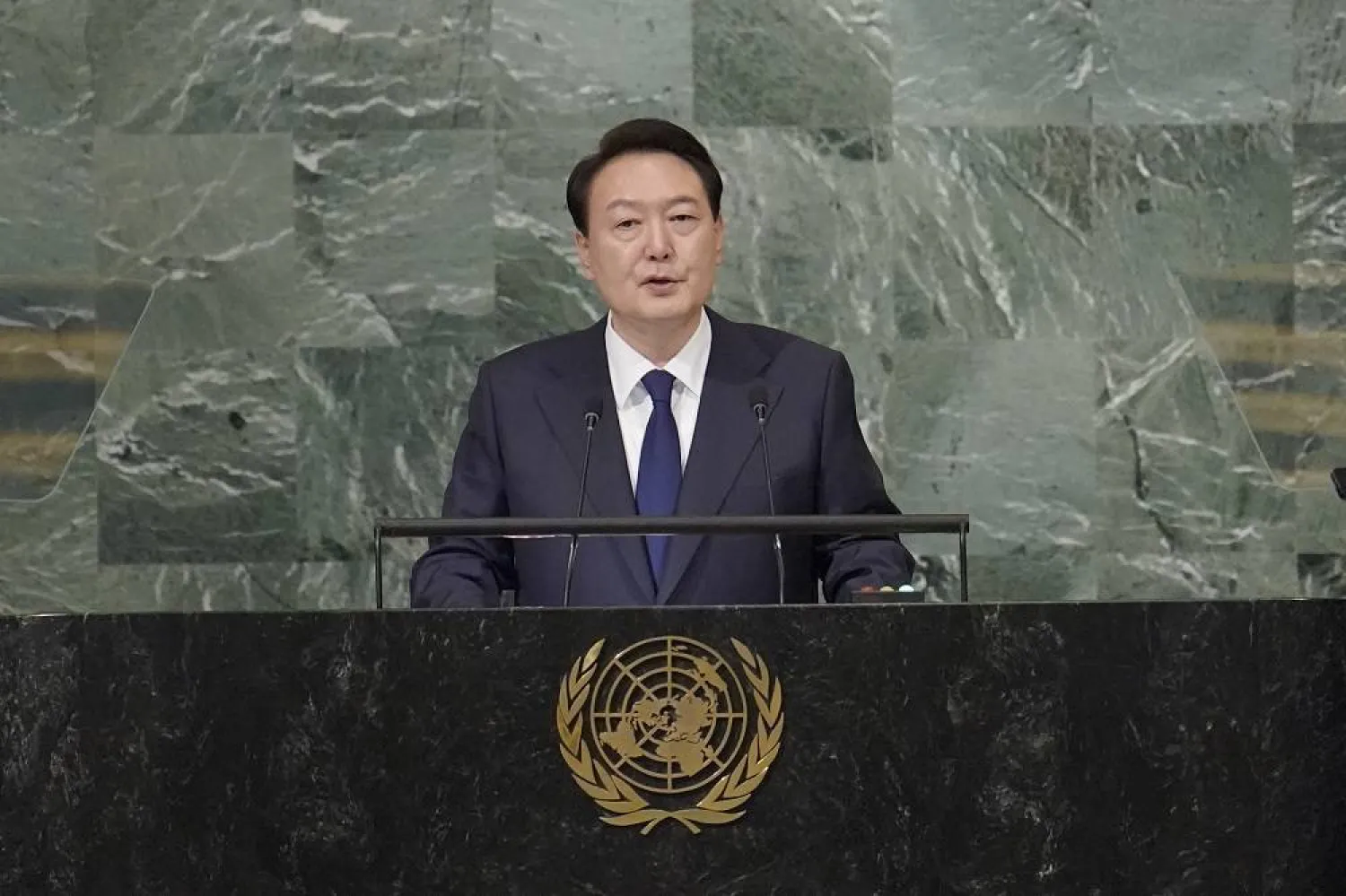South Korea’s president said the international community “will unite more tightly” to cope with deepening military cooperation between Russia and North Korea, as he plans to raise the issue with world leaders at the UN General Assembly this week.
Worries about Russian-North Korean ties have flared since North Korean leader Kim Jong Un traveled to Russia last week for a summit with President Vladimir Putin and to tour a slew of high-profile military and technology sites.
Foreign experts speculate Kim could refill Russia’s ammunition inventory drained in its 18-month war with Ukraine in return for economic aid and technologies to modernize his weapons systems targeting South Korea and the US.
“Military cooperation between North Korea and Russia is illegal and unjust as it contravenes UN Security Council resolutions and various other international sanctions,” South Korean President Yoon Suk Yeol said in written responses to questions from The Associated Press before his departure to New York to attend the UN General Assembly.
“The international community will unite more tightly in response to such a move,” he said.
In his address Wednesday at the annual UN gathering, Yoon will speak about his assessment of the Russian-North Korean moves, according to his office in South Korea, which added it is discussing countermeasures with the US, Japan and other partners.
While Russian-North Korean cooperation is feared to fuel Russia’s war efforts in Ukraine, it has also stoked security jitters in South Korea, where many think a Russian transfer of sophisticated weapons technologies would help North Korea acquire a functioning spy satellite, a nuclear-powered submarine and more powerful missiles.
Some experts still say North Korea would end up receiving food and cash in return for supplying ammunition and shells because Russia closely guards its high-tech weapons technologies.
North Korea’s advancing nuclear arsenal has been a major source of tensions in the region, with the North openly threatening to use nuclear weapons in potential conflicts with its rivals and conducting a barrage of missile tests since last year. In response, Yoon and US President Joe Biden in April agreed to expand joint military exercises, increase the temporary deployments of US strategic assets and launch a bilateral nuclear consultative group.
“Our two countries (South Korea and the US) reaffirmed that any nuclear attack by North Korea will be met with a swift, overwhelming and decisive response that will bring about the end of the regime,” Yoon said.
“Going forward, (South Korea)-US extended deterrence will develop into a joint system in which both countries discuss, decide and act together,” he said. “We will also enhance the ability to deter and respond to any nuclear or missile threat from North Korea.”
Since entering Russia last Tuesday in his first foreign travel in 4 1/2 years, Kim has inspected some of Russia's most advanced weapons systems including nuclear-capable bombers, fighter jets, hypersonic missiles and a warship. During a summit with Putin at Russia's most important space launch center on Wednesday, Kim vowed "full and unconditional support” for Putin.
Some South Koreans call on their government to consider providing lethal weapons to Ukraine in retaliation against Russia's possible weapons technology transfers. But South Korea's Defense Ministry said its policy of not supplying weapons to countries at war remained unchanged.
Yoon recently announced South Korea will provide an additional $300 million to Ukraine next year, on top of the $150 million promised this year. He said South Korea will prepare for a mid- to long-term support package worth more than $2 billion.
South Korea has provided Ukraine with demining equipment, emergency evacuation vehicles, pickup trucks, medical supplies, tablet PCs and other items. Yoon said in the coming year South Korea will continue to communicate closely with Ukraine to send it what is truly needed.
Since taking office last year, Yoon, a conservative, has made a bolstered military alliance with the US the heart of his foreign policy while pushing to move beyond history disputes with Japan — Korea’s former colonial ruler — and expand a trilateral Seoul-Washington-Tokyo security cooperation. That has triggered concerns that South Korea's relations with China, its biggest trading partner, will be hurt.
Yoon dismissed such a notion, saying “the trilateral cooperation harbors no intention of marginalizing any particular nation or establishing an exclusive coalition.”
Citing his meetings with Chinese President Xi Jinping last November and Premier Li Qiang this month, both on the margins of regional gatherings, Yoon said he learned that “China also attaches importance to (South Korea)-China relations.”
During their November meeting, Yoon said Xi expressed his willingness to visit South Korea when the COVID-19 pandemic situation stabilized. Yoon said Li and Japanese Prime Minister Fumio Kishida had also expressed their support for resuming a trilateral Seoul-Beijing-Tokyo summit in South Korea for the first time in four years.
“All three countries — the Republic of Korea, the United States and Japan — share a common understanding that it is important for China to play a responsible and constructive role not only in resolving pending issues on the Korean Peninsula and in the region but also in addressing global challenges,” Yoon said.
In his UN speech, Yoon said that he'll also raise the issue of gaps in three areas — development, climate responses and digital transformation — and present how South Korea will contribute to resolving them.
Yoon said that as a non-permanent member of the Security Council for the 2024-25 term, he'll also mention that South Korea will play a responsible role on security issues that require international solidarity like the war in Ukraine and the North Korean nuclear program. While in New York, Yoon said he will hold bilateral summits with the leaders of about 30 countries.









